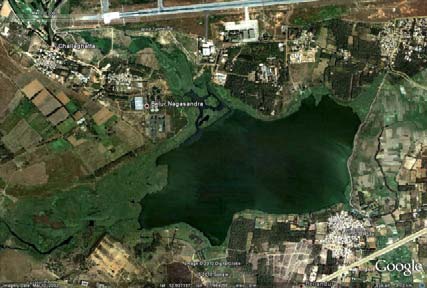 The lakes are now faced with the impacts of rapid urbanization and the Bruhat Bengaluru Mahanagara Palike (BBMP) has been consolidating management of the majority of the city’s lakes under its control in the recent years. The survey dealt with 35 lakes in 10 sub chains in Mahadevpura. The report describes current status, studies changes in extent, and suggests steps for reclamation and conservation.
The lakes are now faced with the impacts of rapid urbanization and the Bruhat Bengaluru Mahanagara Palike (BBMP) has been consolidating management of the majority of the city’s lakes under its control in the recent years. The survey dealt with 35 lakes in 10 sub chains in Mahadevpura. The report describes current status, studies changes in extent, and suggests steps for reclamation and conservation.
The survey suggests individual strategies for each lake based on size, drainage pattern, connectivity, land use and vegetation, biodiversity, and patterns of human use. These strategies consider lake benefits for ground water recharging, acting as green spaces, lung spaces, areas for microclimate, supporting biodiversity, providing areas for exercise and recreational use, educational opportunities to expose urban residents and youth to nature and ecological principles, and important cultural, sacred and livelihood uses for local communities. Specifically,
- Encroachments should be removed and kaluves cleared of blockages. Sewage should be treated by biological control, diversion, and treatment through Sewage Treatment Plants (STPs) at each sub-chain.
- Severely polluted lakes and dry lakes should be dredged with a sloping basin, while reasonably healthy lakes can be treated through clearing of kaluves, and diversion of sewage.
- Appropriate greening should be done with heterogeneity of edges and diversity of water habitats to encourage biodiversity, and careful restoration of aquatic flora and fauna.
- To prevent disturbance to biodiversity, motorized boats should not be permitted and walking and bicycling paths should avoid the marshy diversity-rich areas of the lake.
- Lakes constitute public commons and should be accessible to all. Several of the lakes do not have public access at present and are completely surrounded by private land owners.
- Opportunities should be provided for traditional use and use by urban poor, including for washing of clothes and cattle, and controlled harvesting of grass.
- Ward Task Forces need to be formed with powers to monitor, maintain and regulate lake condition. These should involve local communities, corporators, MLAs, BBMP, Forest Department, BWSSB, schools and colleges, researchers and NGOs.
/articles/lakes-mahadevpura-constituency-bengaluru-current-status-changes-distribution-and